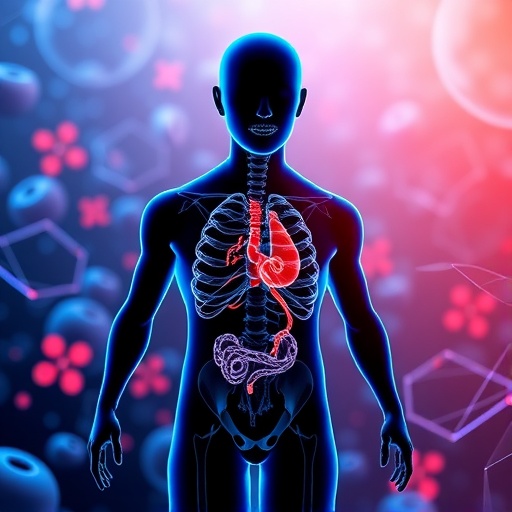In a groundbreaking study published in the November 2025 issue of Cell Death Discovery, researchers have unveiled critical insights into the molecular mechanisms driving renal cell carcinoma (RCC) progression. This advance centers around transketolase (TKT), a metabolic enzyme whose newly recognized role in RCC reveals the intricacies of cancer metabolism and tumor proliferation. The discovery not only sheds light on the metabolic reprogramming of RCC cells but also identifies a synergistic interaction with pyruvate kinase M2 (PKM2), highlighting a complex interplay between two pivotal enzymes that could reshape therapeutic approaches.
Renal cell carcinoma, one of the deadliest forms of kidney cancer, has long eluded effective treatments due to its highly adaptive metabolic phenotype. The study spearheaded by Wang, Q. and colleagues proposes that TKT, an enzyme traditionally known for its function in the pentose phosphate pathway (PPP), drives tumor progression by rewiring cancer cell metabolism. Historically, TKT’s role in normal cellular metabolism was confined to facilitating nucleotide biosynthesis and maintaining redox homeostasis. However, this research demonstrates that in RCC, TKT actively reprograms metabolic flux, promoting an anabolic state conducive to rapid cancer proliferation.
The researchers employed cutting-edge metabolic flux analysis combined with in vivo tumor models to elucidate TKT’s unexpectedly central role in RCC. The data revealed that TKT overexpression correlates with enhanced generation of ribose-5-phosphate and NADPH, vital metabolites for sustaining DNA replication and combating oxidative stress in rapidly dividing tumor cells. This metabolic shift is complemented by marked changes in glycolytic enzymes, particularly the increased expression and activity of PKM2, an isoform well-known for its cancer-associated functions.
Interestingly, the study uncovered a direct biochemical and functional synergy between TKT and PKM2. This relationship appears to form a metabolic axis that fuels RCC aggressiveness. PKM2, which catalyzes the final step in glycolysis, was found to interact physically with TKT, modulating enzyme kinetics and substrate availability. Such crosstalk enhances the efficiency of carbon flux through both glycolysis and the PPP, providing a robust metabolic foundation for tumor growth. This synergy potentially supports anabolic processes including lipid biosynthesis, nucleotide production, and antioxidant defense mechanisms crucial for tumor survival under metabolic stress.
From a signaling perspective, the collaboration between TKT and PKM2 also influences several oncogenic pathways. The study presents evidence that TKT-driven metabolic reprogramming impacts hypoxia-inducible factor 1-alpha (HIF-1α) stabilization and downstream gene expression, processes that are pivotal in RCC pathogenesis. By augmenting HIF-1α activity, RCC cells gain advantages in angiogenesis, metabolic flexibility, and resistance to apoptosis. This multifaceted role underscores the importance of metabolic enzymes in not just cellular biochemistry but also in shaping tumor microenvironment and signaling networks.
Further elucidation of TKT involvement showed that silencing TKT expression through genetic knockdown results in a significant reduction in RCC cell viability and tumor volume in murine models. These findings highlight TKT as a promising target for therapeutic intervention. More compellingly, simultaneous inhibition of TKT and PKM2 produced synergistic anti-tumor effects, suggesting that disrupting their interaction could serve as a novel combinatorial strategy to overcome RCC aggressiveness.
The implications of this research extend beyond RCC. Many cancers exhibit metabolic plasticity, and the identification of TKT-PKM2 interaction provides a blueprint for investigating similar metabolic axes in other malignancies. It challenges the traditional view of metabolic enzymes as mere facilitators of cellular bioenergetics, positioning them instead as dynamic regulators of oncogenic pathways.
Moreover, the application of high-throughput metabolic profiling and proteomic analyses in this study opens new avenues to identify additional interacting partners and post-translational modifications that govern TKT and PKM2 activities. This could deepen our understanding of how metabolic networks integrate with cellular signaling to drive tumorigenesis and metastasis.
The study also prompts a reevaluation of clinical diagnostics. TKT expression and activity levels could serve as biomarkers for RCC progression and patient prognosis. Developing non-invasive assays to monitor TKT and PKM2 metabolic signatures might improve early detection and personalization of therapy, steering precision oncology efforts toward metabolism-based stratification.
Therapeutically, small molecule inhibitors or monoclonal antibodies targeting TKT, PKM2, or their interface might revolutionize RCC treatment. Existing PKM2 inhibitors have encountered challenges due to compensation by other metabolic pathways, but the dual targeting approach suggested by this research may overcome such resistance. Importantly, the elucidation of the molecular structure of the TKT-PKM2 complex paves the way for rational drug design aimed at disrupting their interaction with high specificity.
In conclusion, the pioneering work of Wang et al. represents a paradigm shift in cancer metabolism research, presenting TKT not merely as a metabolic enzyme but as a critical driver of renal cell carcinoma progression through metabolic reprogramming and functional synergy with PKM2. This discovery broadens our comprehension of tumor biology, offering new perspectives on how metabolic and signaling networks converge to sustain malignancy.
Future studies will need to explore the clinical feasibility of targeting the TKT-PKM2 axis, including potential toxicity and effects on normal tissues, given the enzymes’ roles in physiological metabolism. Nevertheless, this research constitutes a cornerstone for innovative strategies to combat RCC, which remains a formidable challenge in oncology.
As we continue to unravel the complex metabolic underpinnings of cancer, such integrative studies exemplify the power of combining biochemical analysis, molecular biology, and translational research to untangle the web of cancer progression and identify vulnerabilities ripe for therapeutic exploitation.
Subject of Research: Renal Cell Carcinoma Metabolic Progression
Article Title: TKT drives renal cell carcinoma progression through metabolic reprogramming and synergistic interaction with PKM2
Article References:
Wang, Q., Tang, A., Zhuang, Q. et al. TKT drives renal cell carcinoma progression through metabolic reprogramming and synergistic interaction with PKM2. Cell Death Discov. 11, 537 (2025). https://doi.org/10.1038/s41420-025-02837-7
Image Credits: AI Generated
DOI: 10.1038/s41420-025-02837-7
Keywords: Renal cell carcinoma, transketolase, PKM2, metabolic reprogramming, pentose phosphate pathway, glycolysis, tumor metabolism, cancer progression, metabolic enzyme interaction




